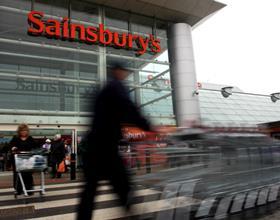
Sainsbury's has reported its seventh consecutive quarter of falling underlying sales.
Like-for-like sales, which exclude the effect of new store space, fell 1.1 per cent excluding sales of fuel in Q2.
Sainsbury's said it was making good progress despite 'food inflation impacting many categories'.
The supermarket group said it now expected full-year underlying profits to be 'moderately ahead' of analysts' expectations of £548 million.
However, that would fall below last year's figure of £681m.
Sainsbury's chief exceutive Mike Coupe, said: 'Both volume and transactions grew as the decline in average basket spend in supermarkets continued to stabilise.
'Whilst the market is clearly still challenging, with food deflation impacting many categories, we are making good progress on delivering our strategy.'
The retailer cited particular progress on improving the taste and texture of its juice ranges and the ripeness and quality of its avocados.
Sainsbury's recently announced a four per cent pay rise for its staff, which came into effect on 30 August.
On Sainsbury’s Q2 results, David Gray, Retail Analyst at business analysts Planet Retail, said: “Once again, Sainsbury’s has posted a subdued set of like-for-like numbers - though improving and markedly better than some arch-rivals, notably Asda.
'The simple fact is the retailer is reeling from the effects of industry-wide falling food prices and stagnant overall food volumes -which, combined, are proving a drag on sales.
“Add to this the twin threats of the growth of the German hard discounters at the value end of the market, and Waitrose/M&S Food at the premium end and Sainsbury’s is stuck squarely at the centre of a perfect storm. Finally, the impact of Tesco’s nascent UK recovery on its smaller competitor has yet to filter through – and the chances are it will not be a positive one.'
He added: “Despite this, Sainsbury’s remains one of the best among a bad bunch - Asda and Morrisons being way behind on like-for-like performance. It also has some key attributes that will stand it in good stead going forward - a sizeable and growing convenience business, fewer very large hypermarkets than its rivals and a still-effective loyalty scheme in Nectar.
“It is also working tirelessly to adapt its big-box formats to a new retail reality through moves like the Argos shop-in-shops and investing in refurbishments to enhance the instore experience - all of which, we feel, will leave it better positioned when the present unfavourable headwinds have passed.”



